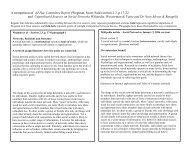Strange Scholarship in the Wegman Report - Get a Free Blog
Strange Scholarship in the Wegman Report - Get a Free Blog
Strange Scholarship in the Wegman Report - Get a Free Blog
Create successful ePaper yourself
Turn your PDF publications into a flip-book with our unique Google optimized e-Paper software.
<strong>Strange</strong> <strong>Scholarship</strong> <strong>in</strong> <strong>the</strong> <strong>Wegman</strong> <strong>Report</strong> V1.0 09/26/10<br />
1.4 Why do people care about <strong>the</strong> shaft?<br />
Understand<strong>in</strong>g ga<strong>in</strong>ed from studies is shown first, split <strong>in</strong>to 3 ma<strong>in</strong> eras,<br />
show<strong>in</strong>g important elements of science for each. Biology, chemistry and<br />
physics <strong>in</strong>form understand<strong>in</strong>g for all eras. Models and data are cont<strong>in</strong>ually<br />
used to cross-check each o<strong>the</strong>r, so scientists care about <strong>the</strong> past. A<br />
straighter hockey shaft implies higher climate stability, whereas stronger<br />
jiggles <strong>in</strong>dicate higher sensitivity to CO2 changes, less stability and higher<br />
chance of more extreme (bad) results. Oddly, those who attack <strong>the</strong> MBH<br />
hockey stick for its straightness, ought to like it, as it argues for lower CO2<br />
sensitivity than <strong>in</strong>ferred by curves with stronger variations.<br />
But of course, <strong>the</strong> attackers do not like it. A possible rationale for <strong>the</strong><br />
attack is shown <strong>in</strong> sketches at right, roughly comb<strong>in</strong><strong>in</strong>g earlier charts.<br />
Suppose ―avoid CO2 regulation at all costs‖ (E) is one‘s goal, from:<br />
� Strong <strong>in</strong>terest <strong>in</strong> us<strong>in</strong>g or especially sell<strong>in</strong>g fossil fuels<br />
� Ideological opposition to government regulation of anyth<strong>in</strong>g<br />
� Any of <strong>the</strong> many o<strong>the</strong>r reasons <strong>in</strong> [MAS2010, Figure 2.6].<br />
It is not easy to attack <strong>the</strong> modern temperature record (B, <strong>the</strong> ―blade‖),<br />
although some try. It is really difficult to attack basic physics, good<br />
enough for approximate answers, although some try that as well. The shaft<br />
(A) of <strong>the</strong> hockey stick really does not matter to policy and <strong>the</strong> blade (B) of<br />
<strong>the</strong> stick is solid. Models (C) that predict temperatures as function of<br />
emissions choices are already good enough, gett<strong>in</strong>g better and are mostly<br />
needed for regional understand<strong>in</strong>g and more accurate forecasts.<br />
―Science bypass‖ is based not on do<strong>in</strong>g real science, but on confus<strong>in</strong>g <strong>the</strong><br />
public, a well-honed tactic developed especially for <strong>the</strong> tobacco <strong>in</strong>dustry,<br />
[MAS2010, §1]. Arguments over statistical m<strong>in</strong>utiae raise doubts and<br />
confusion <strong>in</strong> <strong>the</strong> general public. It works well to <strong>in</strong>voke arguments<br />
accessible only to experts. 3 Ideas are often packaged as anti-science<br />
Memes, repeated endlessly although long ago debunked. Many seem to<br />
attack (A or B) or (D) on credibility of climate science or <strong>the</strong> IPCC, but <strong>the</strong><br />
real goal always seems <strong>the</strong> avoidance or at least delay of <strong>in</strong>convenient<br />
action (E) (―mitigation) <strong>in</strong> favor of ―adaptation‖ alone, usually mean<strong>in</strong>g<br />
that someone else adapts, later or elsewhere.<br />
3 Of people who are sure that MBH99 is a fraud due to decentered Pr<strong>in</strong>cipal<br />
Component Analysis (PCA), what fraction had even heard of PCA before?<br />
16<br />
Our best science says this,<br />
but if more people accepted it,<br />
<strong>the</strong>y might act (E) to change C.<br />
But some have clear goal:<br />
avoid any restriction CO2 o<strong>the</strong>r GHGs.<br />
Relatively few would o<strong>the</strong>rwise care<br />
about fights over tree-r<strong>in</strong>gs. XXX fix<br />
A<br />
Paleoclimate: Proxies<br />
D: Climate science, IPCC<br />
B<br />
Modern: Data<br />
1) Avoid acceptance of E<br />
1a) Attack models<br />
1b) Attack IPCC credibility<br />
2) B <strong>in</strong>creas<strong>in</strong>gly hard target, but is hockey blade ,<br />
3) Attack (~~irrelevant to C) hockey shaft (A)<br />
3a) Attack statistics of 1999 about A<br />
3b) Confusion rubs off on B<br />
3c) and on credibility of (D) climate science and<br />
IPCC …Good strategy! It works!<br />
3a<br />
3b, 3c<br />
? E: Act<br />
C<br />
Future: Models<br />
? E: Act<br />
Not so bad



